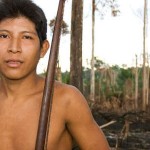WASHINGTON, DC (March 23, 2011) – In her first public appearance since returning from Paris, Egypt and Tunisia, US Secretary of State Hillary Rodham Clinton was clear and compelling in her remarks Tuesday commemorating World Water Day 2011. Joining with World Bank President Robert Zoellick and key philanthropic and corporate leaders, the Secretary called for a comprehensive response to the global water and sanitation crisis.“We’re always juggling the urgent and the important. And oftentimes, the urgent can swallow up everything else. Well, we need to keep our eye on the long-term and the important as well,” the Secretary said. “We know that for hundreds of millions of people today, water represents a deadly threat. And the risks that they face in finding water, hauling it, drinking it, cooking and bathing with it, add up to the defining challenge of their lives. There is nothing more urgent and important than that.”
Convening at the “ Water for the Future” event at the World Bank Headquarters, dozens of US Government and World Bank leaders joined to witness the signing of a Memorandum of Understanding (MOU) between the US Government and World Bank, as well as new commitments to solve the global safe drinking water and sanitation crisis made by the Conrad N. Hilton Foundation and The Coca-Cola Company. The MOU enables the World Bank to work with 17 different US Government agencies to solve the world’s water and sanitation crisis, which the Secretary described as “a critical issue that cuts across every single part of development that one can imagine.”
“The water crisis can bring people together. In fact, on water issues, cooperation, not conflict, is and can be the rule,” said the Secretary. “So let’s get about the business of working together – creatively, collaboratively, and quickly – to make a difference, to make our contribution to solving the water crisis and to bring greater health and stability to more of the world’s people.”
Steve Hilton, President of the Conrad N. Hilton Foundation, invited several of their grantees to join him onstage, including the Millennium Water Alliance, UNICEF, WaterAid America, and World Vision.
“Lack of access to safe water and sanitation remains a major challenge in developing countries, making an already bad situation worse in impoverished communities,” Hilton said. “Since 1990, the Hilton Foundation has invested $84 million in clean water, serving more than two million people through our partner organizations. I’m very pleased to announce here today that our board recently pledged another $50 million in grants over the next five years for safe drinking water, sanitation, and hygiene in communities of greatest need in West Africa, India, and Mexico.”
Jeff Seabright, Vice President of The Coca-Cola Company, also announced a new $6 million commitment to helping solve the water and sanitation challenge in Africa. He was joined by Steve Hollingworth, a senior executive at CARE, one of The Coca-Cola Company’s nonprofit partners.
Tuesday’s event at the World Bank is the centerpiece of this week’s activities in Washington and across the United States, many of which are being shared with online audiences through a national digital and social media awareness campaign. Tracking the news at #water2011 and #water2011news, the online/viral campaign asks people to “donate their voice” on either Twitter or Facebook to the cause for this week. The groundbreaking campaign has surpassed its goal of 1 million listeners, having attracted nearly 2 million listeners so far.
The Pulitzer Center on Crisis Reporting is participating in and filming several of the events and activities of the week, which include a forum dedicated to sustainability and best practices in the global water and sanitation sector. World Water Advocacy Day is taking place today, March 23 on Capitol Hill. Advocates from across the country are coming together to call on Congress for greater US leadership on access to water and sanitation for the world’s poor.
Safe drinking water and sanitation are the most effective – and one of the most efficient – ways to invest foreign assistance and private philanthropic dollars to improve health and alleviate poverty worldwide. Each dollar invested in safe drinking water and sanitation provides an eight dollar (8:1) return on that investment in reduced healthcare costs and time savings. Access to safe water and basic sanitation is the foundation of sustainable progress toward other important development objectives, including health, child survival, gender equity, education (especially for girls), the environment, poverty alleviation and human security.
At a time when one in eight people worldwide does not have access to safe drinking water and two in five people lack access to basic sanitation, the water and sanitation crisis is among the most pressing issues facing the global community. A child dies every 20 seconds, and more than 2 million people die each year from preventable water-borne diseases. Women and children in the developing world are disproportionally affected by the global water and sanitation crisis. Children are the most susceptible to water, sanitation and hygiene-related illness, which factors into nearly all of the major causes of child death, including diarrhea, pneumonia and malnutrition. Women and girls spend hours every day fetching often unclean water, preventing them from more productive activity. Girls often stop attending school when there are no sanitation facilities, thereby perpetuating a cycle of illiteracy and poverty.




Leave a Reply